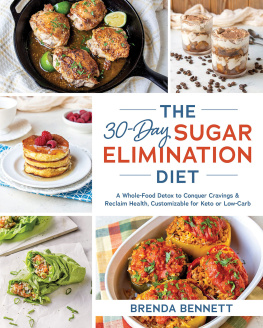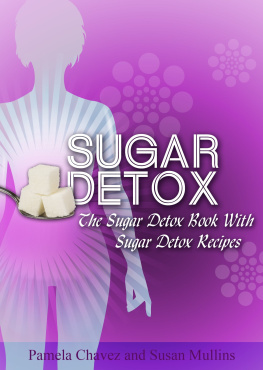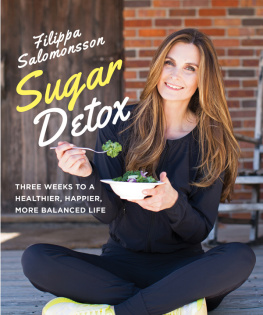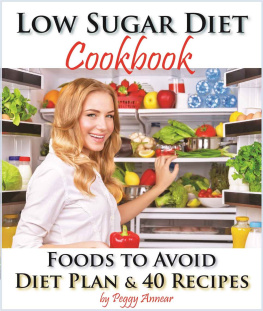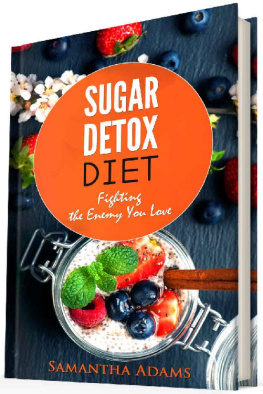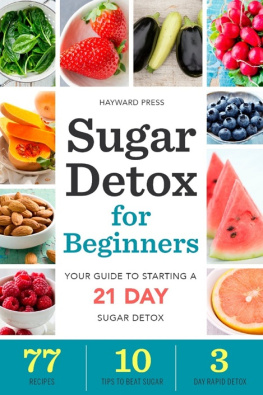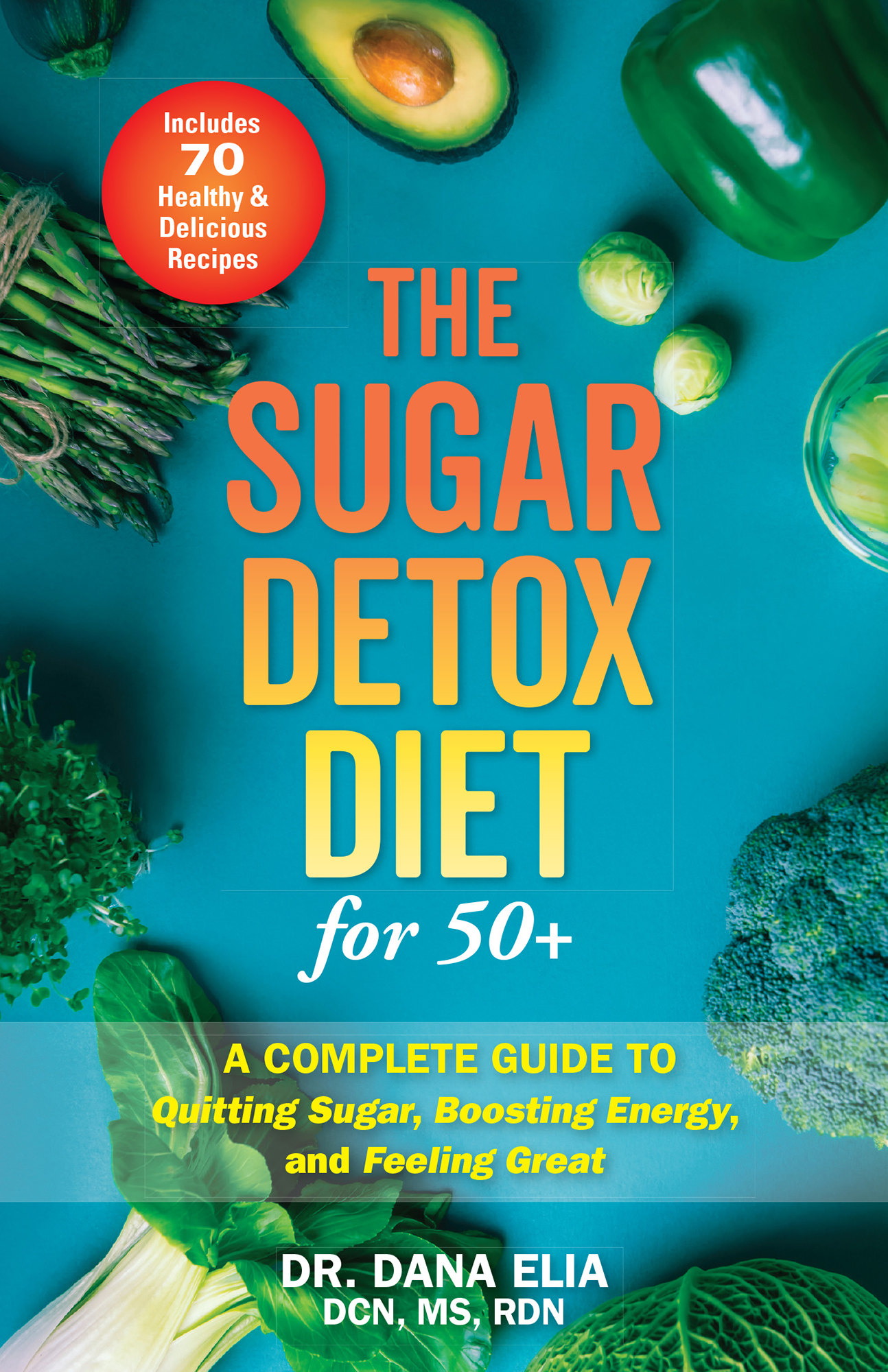Contents
Guide
For all those who seek to regain the power over their body and what goes into it. Let us break free from the unhealthy foods that drive and define our choices.
PREFACE
As a clinical functional nutrition doctor and registered dietitian nutritionist, my goal for this book is to explain to those of you in the fifty and over crowd how to safely and effectively eliminate excess sugar from your diet to boost energy, help with weight loss, and prevent harmful health conditions such as heart disease, diabetes, and cognitive dysfunction. Unlike many other books on this topic, our journey together will focus on stepping down from a life driven by sugar, rather than an abrupt breakup. Inside, youll also find recipes for breakfast, lunch, dinner, and snack options. Taming your sweet tooth has never been easier!
INTRODUCTION
WelcomeIm so glad that youve chosen to take the initial step toward improving your health, and I look forward to providing you with some tools and resources to help you along your wellness journey. Together were going to map out just whom this book is geared for and why its important to take an honest look at your diet and relationship with sugar. Ive been in these trenches myself, having struggled with sugar cravings, weight issues, and trying to navigate my way through determining what my body truly needs most in order to thrive and function optimally.
You may be curious about what makes me an expert on sugar, detoxing, or dieting, as it seems diet experts are a dime a dozen these days. If I told you I had been a dieter for decades, would that make me an expert? Ive also gone from weighing well over 300 pounds, barely squeezing myself into a size 26, to maintaining a healthy weight in the 140s. Does successfully losing weight automatically make me an expert on the topic? It may seem like many of the pop culture experts are those whove tried a diet, were successful, and now suddenly have a platform to claim expertise in diet and nutrition. However, dieting success does not equate to expertise; therefore, I strongly encourage you to seek out nutrition and all health-related advice from qualified, licensed clinicians.
For most of my young adult life, weight management was an issue. I was born a big baby at 8 pounds 12 ounces. As a functional medicine provider, I can now recognize the factors that influenced my own health struggles and sparked decades of battling my weight. In fact, when teaching students or speaking to other clinicians, I often use my own timeline and matrix as the perfect example for a functional medicine case study. We are all dealt a hand of cards with which to play and, unfortunately, my hand was less than perfect. But it led me down a path that I am forever grateful for, as the struggle is often the most important part of each individuals journey. Mine has taught me many invaluable lessons.
The brief CliffsNotes version of my history includes exposure to various toxins in utero, being born via C-section, not being breastfed, experiencing food sensitivities that emerged at a young age (some still persist today), getting irritable bowel syndrome (IBS), and getting chronic strep infections that ultimately led to a diagnosis of juvenile rheumatoid arthritis. Thus began an onslaught of drugs and health issues through my elementary school, high school, and even college years. For years I was given various rounds of corticosteroids, high doses of aspirin, nonsteroidal anti-inflammatory drugs (NSAIDs), and eventually, Plaquenil and weekly methotrexate injections. By the time I was ready to begin my undergraduate program in dietetics, I was morbidly obese, and my rheumatologist had added hypothyroidism, fibromyalgia, and systemic lupus erythematosus to my diagnosis list, along with suggestions for more heavy-duty meds. Throughout my preteen, teenage, and even college years, I experimented with every single diet imaginable and was even put on prescription diet pills. My decision to study nutrition and dietetics instead of going premed as I had always intended stemmed from being at my wits end in the fight to heal my own body. I decided there had to be a better way than what conventional diets and allopathic, or traditional, conventional medicine had offered me.
That journey has taken me on the path of personal exploration and truly learning to be in tune with my bodys signals. Along the way, Ive not only successfully maintained a healthy weight and managed my autoimmune issues solely through nutrition and lifestyle, but also earned three degrees in health and nutrition. So back to the question of expertise in the field of nutrition: education combined with personal experience does in fact qualify me as a subject-matter expert. Diet and nutrition have been my lifes passion as they have been the key to my personal health and wellness, as well as that of my patients.
When I did my undergraduate training in dietetics in the early 1990s, the approach to nutrition and health was very much in line with traditional conventional medicine dogma. That approach never quite sat well with me, not only because it didnt work for my own struggles with weight and autoimmune disease, but also because I had seen it fail friends and family time and time again. I was drawn early on in my studies to what we now call integrative and functional medicine. Over the past few years, Ive been pleased to see more awareness and acceptance of more integrative and functional approaches to health, wellness, and chronic disease management.
After working in the fields of nutrition and dietetics for over twenty-five years, I feel as if we are finally at a crossroads where traditional allopathic providers and integrative and functional providers meet. Collectively, we are working with more knowledge and a better understanding of just how influential diet and nutrition are in chronic disease. For example, evidence-based research illustrates the complex issue of obesity. It is not merely a seesaw balancing calories in versus calories out; thats the old energy balance mentality. We will explore some of the factors contributing to the obesity epidemic in our discussions herein.
Our society is at a critical breaking point. The current generation will likely be sicker, with shorter life expectancies than their parents generation. Its a frightening thought to imagine that our children will live shorter, unhealthier lives than we will. Obesity rates are spiraling out of control, along with other chronic health issues. For example, the rates of inflammatory bowel disease (IBD) have skyrocketed. The Western diet (or Standard American DietSAD), with its promise of inexpensive, quick fixes that taste good, is fueling this crisis. SADs composition of highly refined carbohydrates, excessive sugar, chemical-laden and genetically modified foods, trans fats, and refined omega-6 vegetable oils makes it a highly combustible combination, existing merely to promote inflammation and illness.
As my membership card to the fifty and over club looms right around the corner, my goal is to help you see that food can be a powerful tool in making the fifties and beyond your best years yet! And the real kicker here is that these years do not need to be sugar-coated!
CHAPTER 1 WHATS THE 411 ON NUTRITION BASICS?
Lets get this journey underway. Im going to challenge you by asking you to cast aside everything you think you know about nutrition and diet. What we do know beyond a shadow of a doubt is just how profound an impact a poor-quality diet has on our health. Such a diet consists of a higher intake of processed foods, resulting in an overall higher intake of calories but a loss of vital nutrients. Poor-quality diets are typically deficient in fiber, vitamins, minerals, essential fatty acids, and other healthy components such as polyphenols and other phytonutrients. Polyphenols and phytonutrients are obtained through plant-based foods. In my opinion, they are natures miracle workers, as they are jam-packed with antioxidants and a multitude of health benefits. For our focus on sugar detox, phytonutrients help to stimulate enzymes that assist the body to get rid of toxins while also giving a boost to the immune system, promoting healthy metabolism of hormones (like estrogen), enhancing cardiovascular health, and hastening the death of cancer cells.


